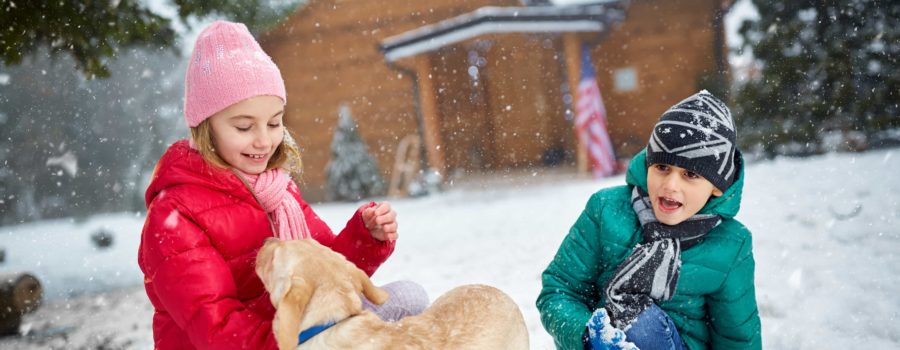Many dogs and cats seem to enjoy time outside in the cold weather. Some dogs just love to play in the snow! Although our furred companions are better protected than we are when it comes to winter weather, they are still susceptible to the effects of the cold. Hypothermia and frostbite are both potentially serious medical complications that can affect pets who spend too much time in weather that is too cold for them.
Know The Symptoms
One of the most important aspects of caring for a pet in inclement weather (whether it be cold or hot), is knowing the signs of discomfort or distress. Signs that your pet is getting too cold are shivering, lethargy, listlessness, disorientation, and anxiety. If your pet is exhibiting any of these symptoms you should get into a warm space as quickly as possible and contact a veterinarian. For severe cases such as possible hypothermia or frostbite, head immediately to a veterinarian. Here are some tips to make sure things don’t get that point.
Tips for Walking
Clothing for cold pets: Sweaters, jackets, and other types of pet clothing aren’t just for cosmetic purposes—they can seriously help
keep your pet’s body warm when out on walks in the cold. Even long haired animals can benefit from a little added protection. It is also a good idea to have more than one sweater for your pet; a wet sweater is only going to make your pet colder if taken out into the weather. If you don’t have multiples of each clothing item, make a habit of throwing wet dog clothing into the dryer as soon as you get home.
Wear Reflective Gear: Since cold weather often comes during the shorter days of the year (and during daylight savings time) you may find yourself out on walks in the dark much more frequently than in the Spring or Summer. Darker roads mean less visibility, and we highly recommend getting reflective gear for both your pet and yourself if you plan to be out walking regularly.
Washing down and drying off after the walk: Coming inside from a walk is often a rapid environmental transition from cold and wet to warm and dry. Bringing a pet into a heated home and leaving them to air dry can lead to dry, itchy, and irritated skin. We recommend toweling them off as soon as you get home. Additionally, if you live in an area that uses rock salts to keep the roads from icing over, make sure to wash off your pet’s feet and underbelly. These salts are not good for your pet to ingest and will likely get licked up if left on your pet. Booties are another great solution to this problem, and come with the added benefit of keeping dry and cold paw pads from cracking out in the cold. Be sure to check their paw pads regularly after walks in the cold as hurt paws are a common issue for many pet owners.
General Tips
Keep ‘em inside: This probably goes without saying, but keeping pets indoors is easily the best way to avoid injury from the cold. This can be a difficult and unpleasant for indoor-outdoor cats who don’t want to be cooped up inside all the time, but they’ll thank you for it in the long run. One extremely important aspect of keeping cats indoors is providing them with adequate stimulation—think about getting some cat toys and scratching posts so that they have things to keep them occupied. Under stimulation can lead to many negative side effects for cats.
Familiar scents get masked by snow/ice: Unfortunately, snow and ice can mask familiar scents which your pet uses to find its way home; pets who would normally be able to find their way home from down the block can get confused or stuck without their usual scents to guide them. This can lead to them running away, getting stolen, or injured out in the cold. Outdoor cats should absolutely be kept indoors during the coldest times of the year.
DO NOT LEAVE YOUR PET IN THE CAR: If you’ve read our article on why pets shouldn’t be left in cars while traveling, then you already know the reasoning behind this one. While cars may seem like they are at least partially insulated from the cold, they actually amplify the weather around them and can become frigid rapidly when left in the cold weather. If you see a pet left alone in a car during the cold, either alert the owner or call the authorities.
Cats and Car Hoods: Cats love to hide inside of engine compartments in the cold weather. If you have cats living with you or in your neighborhood, give the hood of your car a loud tap or bang to give any unwanted shelter seekers the opportunity to take off before you do. Honking your horn should also produce the same effect.
Ensuring adequate shelter: If you do have to leave one of your animals outside and unattended for any length of time in the cold, we highly recommend creating a safe and comfortable shelter for them. For starters, make sure that they have fresh and warm water—metal bowls should absolutely NOT be used as pets’ tongues can get stuck to them when frozen. You might want to invest in a heated water bowl that will ensure water stays warm and drinkable.
Proper Bedding: It is important to provide warm, comfortable, and appealing bedding for your pets. Make sure that their bedding is left in an enclosure that protects it from strong winds. Just as with sweaters, make sure that all bedding is dry and frequently exchanged— wet bedding is often as good as no bedding. If you are constructing a shelter in your back yard, remember to keep it raised off the ground to minimize the amount of heat that gets absorbed by the cold ground.
Know if your pet has conditions which are made more dangerous by cold weather: According to the AVMA, “Pets with diabetes, heart disease, kidney disease, or hormonal imbalances (such as Cushing’s disease) may have a harder time regulating their body temperature, and may be more susceptible to problems from temperature extremes”. They go on to add that similar considerations should be made for pets that are very young or very old.
The Importance of Annual Exams in Cold Weather climates: Since diseases, illnesses, and injuries get exacerbated by cold weather, one of the best and most reliable ways to ensure that you are aware of any potential problems in your pet is to have them seen annually for a general wellness exam.
Winter time toxins such as antifreeze: Antifreeze is of one of the most ubiquitous and dangerous products that gets stored either in cars or garages during the winter time. When ingested, even very small amounts of antifreeze can be deadly. Unfortunately, this chemical has a sweet smell and taste that attracts animals to it. For this reason, you have to be proactive about keeping it away from your pets. If you do purchase antifreeze, consider buying kinds that contain propylene glycol rather than ethylene glycol as it is less toxic. If you have any reason to believe that your pet has ingested antifreeze you should take them to the vet immediately: don’t wait for symptoms to manifest!
Space Heaters: This tip is as much for you and your human family members as it is for your pet. Space heaters, especially those with exposed heating elements, are prone to getting knocked over or pushed into contact with other pieces of furniture. Overturned or wayward space heaters are a huge fire risk. If you do have a heater, make sure it is somewhere that you can observe it if you have pets around it.
Food: Finally, if you have an outdoor pet who is staying active during the cold winter months, be sure to adjust their food needs accordingly. Playing in the cold burns more calories than playing in normal weather—pets have to expend extra energy to maintain their internal temperature. Since your pet will be spending more calories, you may want to start feeding them slightly more. As with any food related question, the best answer is always going to come from contacting your veterinarian; the proper diet for any given individual is based on a number of factors (breed, age, overall health, and activity level, to name a few) and must be custom tailored by a veterinarian for each animal.
Remember, winter weather is hard on everyone, even our seemingly well protected animals.
Disclosure: This article contains an affiliate link, which means that we receive a commission if you decide to purchase the product. We will only recommend products that we believe are a good fit for our readers.
Was this article helpful? For more great insights on how to take the best care of your pet, check out our free pet care tips!
Click Here for Access






